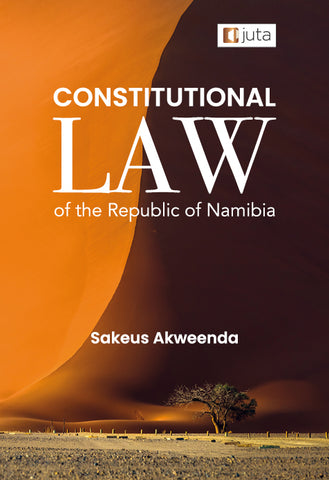
Constitutional Law of the Republic of Namibia, 1st Edition
Product Details:
| Author(s): | Akweenda, S |
| Page count: | 760 |
| ISBN: | 9781485139300 |
| Languages(s): | English, |
| Year Published: | 2023 |
| Categories: | Africa, Constitutional and Administrative Law |
| Type: |
About this publication
Constitutional Law of the Republic of Namibia offers a comprehensive account of Namibian Constitutional law. Judicial review of administrative action and the remedies to be awarded by the courts to aggrieved persons are addressed. The book also gives an account of the principles of human rights and many areas of international law.
Constitutional Law of the Republic of Namibia is primarily intended for courts, legal practitioners, academics, law students and administrators. It will also be of immense value to Members of Parliament and scholars of political science, international relations, and history.
The work addresses the power vested in the President in terms of article 26 to declare, by proclamation, a state of emergency and to make regulations, including the power to suspend the operation of any rule of the common law or statute or any fundamental right or freedom protected by the Constitution.
Constitutional Law of the Republic of Namibia also includes commentary on the powers, duties and functions of the Office of the Ombudsman, the Anti-Corruption Commission, the Judicial Service Commission, the Public Service Commission, the Security Commission, the Central Bank and the National Planning Commission. The courts have, indeed, clarified the powers, duties and functions of these offices, ministries and agencies.
Content
CHAPTER 1: Historical Overview
CHAPTER 2: Establishment of a State and founding principles
CHAPTER 3: Principles of interpretation of the Constitution
CHAPTER 4: National symbols, language and citizenship
CHAPTER 5: The Executive
CHAPTER 6: The Legislature – National Assembly
CHAPTER 7: The Legislature – National Council
CHAPTER 8: The Judiciary
CHAPTER 9: Regional and local government
CHAPTER 10: Attorney-General
CHAPTER 11: Protection of fundamental human rights and freedoms, life and liberty
CHAPTER 12: Human dignity, slavery, servitude and forced labour
CHAPTER 13: Equality, freedom from discrimination, arrest and detention, fair trial, and privacy
CHAPTER 14: Family, children’s rights, property, political activity, culture, and education
CHAPTER 15: Fundamental freedoms and limitation upon them
CHAPTER 16: Administrative justice
CHAPTER 17: Enforcement of fundamental rights and freedoms
CHAPTER 18: Apartheid and affirmative action
CHAPTER 19: Derogation
CHAPTER 20: The Ombudsman
CHAPTER 21: Principles of State policy
CHAPTER 22: Common law and customary law
CHAPTER 23: The Prosecutor-General
CHAPTER 24: Anti-corruption measures
CHAPTER 25: Judicial Service Commission and Public Service Commission
CHAPTER 26: The Electoral Commission
CHAPTER 27: Security Commission, Defence Force, Police Force, Intelligence Service and Correctional Service
CHAPTER 28: Provisions relating to international law
CHAPTER 29: Law in force on date of independence, deeming provisions and transitional provisions
CHAPTER 30: Finance
CHAPTER 31: Central Bank and National Planning Commission
CHAPTER 32: Public emergency, state of national defence and martial law
CHAPTER 33: The Schedules of the Constitution
CHAPTER 34: Repeal and amendment of the Constitution
CHAPTER 35: Conclusions
Index
We Also Recommend





